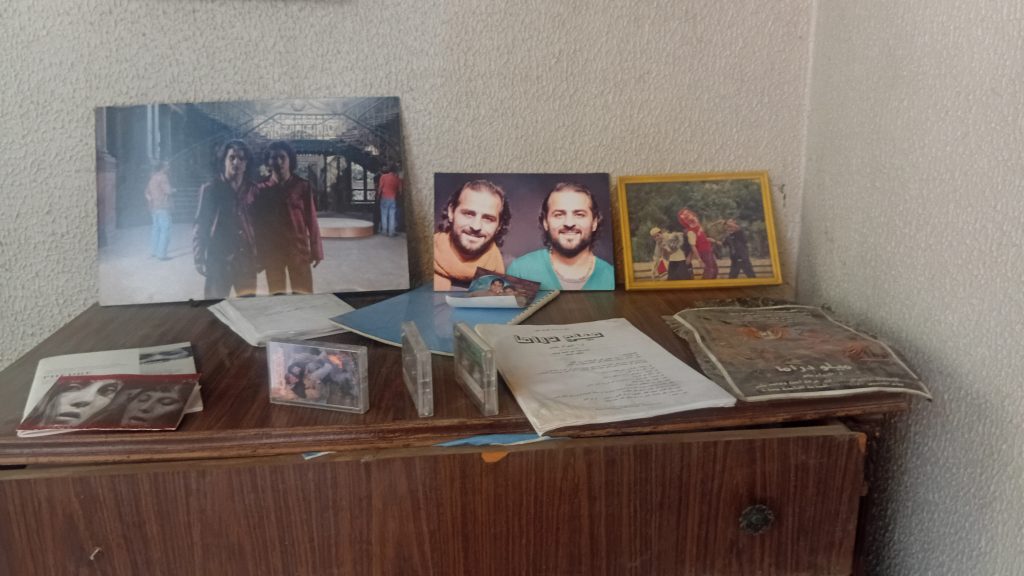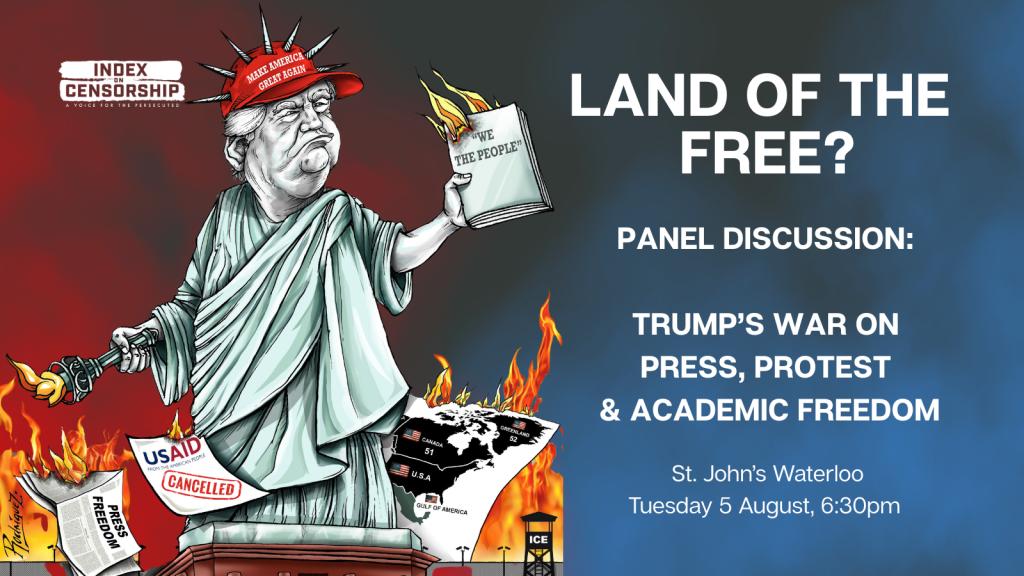26 Sep 2025 | Middle East and North Africa, News, Syria
In the upscale Damascus neighbourhood of Al-Adawi, a blue metal door bears a sign reading: “The One Room Theatre.”
The entrance feels unwelcoming. The adjacent garden is frozen in time, suggesting abandonment. This impression deepens beyond the threshold – a cluttered “waiting room” overflows with scattered cassette tapes, faded playbills, film posters and yellowed newspaper clippings haphazardly pinned to walls and windows.
Dominating the wall in the theatre room, is a photo of identical twins, Mohamad and Ahmad Malas. Over 15 years ago, they dreamed of entering Syria’s theatrical scene. Rejected by state institutions that dismissed their vision, they converted a room in their family home into an intimate theatre. Small in size, vast in ambition.
Militias in support of former President Bashar al-Assad’s regime had occupied the house at some point during the Syrian civil war, according to Mohamad Malas, but family relatives later expelled them.
“When the regime fell last December we rushed back from a Jordan film festival,” he told Index. “Returning home was painful – the house stood looted and empty. Its soul has gone.”
Ahmad Malas recalls writing plays with his brother in 2009, inspired by their studies at a private Damascus theatre institute.
Under Assad’s rule, addressing direct political topics was forbidden, so they crafted humanist stories with whispered political undertones. After the Directorate of Theatres repeatedly ignored their licensing requests, they launched the underground One Room Theatre.
They hosted three plays, the last of which was staged shortly after Syria’s revolution began.
As protests surged, the twins joined the uprising personally, not only through art. Arrests and security threats followed, forcing them to flee Syria in late 2011. Heartbroken, they locked their theatre door. Months later, their family abandoned the home and headed to Saudi Arabia, leaving it silent.
The Malas Brothers drifted through Lebanon, Egypt and finally France, where they pursued theatre in Arabic and French. One play, The Two Refugees, serendipitously reached Damascus in late 2024.
On their return, the twins deliberately left the waiting room’s chaos untouched – tapes strewn, posters peeling. Their only change was to move the theatre to a sunlit balcony near the kitchen due to Syria’s chronic power cuts. At 4pm, natural light frames their play All Shame Upon You.

Photo by Mawada Bahah
Mohamad Malas explained that the play, staged 20 times post-Arab Spring but paused in Syria, now features rewrites “we’d never dare perform before liberation”.
The performance unfolds on a crumbling sofa “stage” before low chairs. It follows two opposites sharing a flat: a heartbroken intellectual whose lover married during his imprisonment, and a crude soldier dreaming of martyrdom-for-glory. Their clashes blend rage, dancing and tears, culminating in the soldier forcing the poet to call his lost love.
The Culture Ministry has promised support – unlike the pre-revolution era when security agents monitored every show. Yet the twins remain pragmatic.
“The theatre in Syria doesn’t pay for bread,” Mohamad Malas said, adding that he and his brother will split time between France (to earn a living) and Syria (to follow their passion).
Their French passports offer global protection but “mean nothing in Syria,” he added. “If a French passport serves me better, our country is still on the wrong path.”
In their last show on 5 June, before they returned to France, the Malas brothers cautiously pushed boundaries, hinting at identity-based killings on Syria’s coast earlier this year.
In March, hundreds of minority Alawite civilians in coastal cities were killed by Sunni fighters, according to Reuters news agency reporting and several monitoring groups. Assad belonged to the Alawite sect, and the massacre came after a rebellion by remaining Assad loyalists, that ended in bloodshed.
The attacks took place only three months after Assad’s ousting in December ended his brutal rule and followed almost 14 years of civil war.
“Freedom isn’t just criticising the past regime,” Mohamad Malas said.
A pivotal line lingers in his play: “Was the homeland worth all this suffering?” When asked, Ahmad Malas admitted: “Sometimes, no, not after children died in Daraya, Ghouta… then again on the coast after the revolution.”
Despite Syria’s wounds, they harbour hope: “Mistakes happened, but awareness and law can heal rage.”
But despite the gloomy theme of the play, the Malas brothers struggle to hide their joy. The reason is that they’re finally able to stage work without censors hiding in the audience.
24 Jun 2025

Since returning to office, Donald Trump has intensified efforts to crush dissent in the USA: cracking down on protest, targeting the press and threatening academic freedom. His campaign against free expression is sending shockwaves across the USA and beyond.
What does this mean for democracy, independent journalism, and the right to speak out?
Join us on Tuesday 5 August at St John’s Waterloo for the launch of Land of the Free?, the latest magazine issue by Index on Censorship. Come for a reception and panel discussion looking at the impact of the Trump administration on free speech in the USA, and the wider implications for the rest of the world.
Speakers
Anvee Bhutani
Anvee is an award-winning American journalist & a reporter at The Wall Street Journal in London. She has reported across four continents, from the aftermath of the Moroccan earthquake and Palestinian refugee camps in Lebanon to the U.S.-Mexico border and Muslim communities in India. Most recently, she was a contributing reporter with The New York Times, covering the government crackdown on higher education and pro-Palestine activism. Anvee has worked with outlets including the Guardian, Teen Vogue, the BBC, the Telegraph, Channel 4, CNN and MSNBC, where she was part of the Emmy-nominated US 2024 election night coverage. A graduate of Columbia Journalism School the University of Oxford, Anvee is a strong advocate of global press freedom. She speaks five languages.
Charlie Holt
Charlie is the European lead for Global Climate Legal Defense (CliDef), which emboldens climate defenders to act in the face of risk knowing that lawyers have their backs. Prior to CliDef, Charlie advised on legal strategy for Greenpeace International, where he led the organisation’s SLAPP resilience strategy and sat on the European Commission’s Expert Group on SLAPPs. He currently sits on the Steering Committee of the Coalition Against SLAPPs in Europe (CASE) and co-chairs the UK Working Group on SLAPPs. Between 2016 and 2024, Charlie advised on the Greenpeace International response to two aggressive large-scale SLAPPs targeting Greenpeace entities in the USA – including the Energy Transfer lawsuit filed in response to the North Dakota pipeline protests – and in 2018 helped to set up the US anti-SLAPP coalition Protect the Protest.
Hanna Komar
Hanna Komar is a Belarusian poet, writer, translator and performer. She’s published five poetry collections, including the most recent Ribwort, and a non-fiction book about the experience of incarceration for peaceful protest in Belarus. Her debut play Body in Progress was staged at the Voila! festival in London.
She will perform a poem informed by the banned words list introduced by Trump administration, co-written with Katerina Koulouri.
Erica Wagner
Erica Wagner is Consulting Editor, Comment for the Observer. She was the literary editor of the London Times for seventeen years and is a contributing writer for the New Statesman, consulting literary editor for Harper’s Bazaar and a host of the CHANEL podcast, “Les Rencontres”. She is the author of Chief Engineer: Washington Roebling, The Man Who Built the Brooklyn Bridge, winner of the Eccles Centre and Hay Festival Writer’s Award; her other books are Ariel’s Gift, Seizure, Gravity, Mary and Mr Eliot: A Sort-of Love Story and she is the editor of First Light, a celebration of the work of Alan Garner. She was made a Fellow of the Royal Society of Literature in 2023 and in 2025 was awarded a Public Humanities Fellowship by the School of Advanced Study, University of London. She identifies as a New Yorker.
About Index on Censorship
Index on Censorship is a UK-based charity dedicated to defending and promoting freedom of expression around the world. Founded in 1968 as Writers and Scholars International, we have a long and proud history of standing up for the right to speak, write, create and protest without fear. Read about the history of Index on Censorship
We publish the work of censored writers and artists, spotlight global threats to free speech, and foster debate on the value of freedom of expression. We believe that everyone should be free to express themselves without fear of censorship, persecution or violence. Our mission is simple but vital: to raise awareness, challenge suppression and amplify voices that others try to silence.
Sponsored by Sage.
20 Feb 2025 | Israel, Middle East and North Africa, News
Following the grotesque scenes of Hamas celebrations in Gaza, we pay tribute to the journalist and human rights activist Oded Lifshitz, whose body has been identified by his family.
Although the grandfather was long retired, he was remembered by colleagues around the world as one of the first journalists to report on the notorious 1982 massacre of Palestinians at the Sabra and Shatila refugee camps in Lebanon.
Lifshitz worked for many years on the left-wing Israeli daily paper Al HaMishmar, which closed in 1995. Its slogan was “For Zionism, Socialism and Brotherhood Amongst Nations” and was often criticised by the religious right in Israel for its liberal stance.
Lifshitz, aged 83 at the time of his capture, was known as a campaigner for Israel’s Bedouin Arab community and was reported to be responsible for a high court case that returned some of their land. In retirement he worked for the organisation Road to Recovery, which helped Palestinians cross the Erez border from Gaza into Israel to receive medical treatment. He and his wife Yocheved, who was also kidnapped by Hamas but released in October 2023, were lifelong peace activists.
Lifshitz was one of the founders of Kibbutz Nir Oz, a village less than seven kilometres from the Gaza border. The kibbutz was destroyed in the attacks of 7 October 2023 and it is thought that nearly half of its 400 residents were kidnapped, killed or injured.
The National Union of Journalists general secretary Laura Davidson today paid tribute: “Our sincere thoughts are with Oded Lifshitz’s family at this difficult time. Like many, we had hoped for the safe release of the journalist committed to peace. Journalists worldwide will no doubt share their deepest condolences with his loved ones today.”
In a statement, the Lifshitz family said: “We received with deep sorrow the official and bitter news confirming the identification of our beloved Oded’s body. 503 agonising days of uncertainty have come to an end.
“We had hoped and prayed so much for a different outcome. Now we can mourn the husband, father, grandfather, and great-grandfather who has been missing from us since October 7.
“Our family’s healing process will begin now and will not end until the last hostage is returned.”
At Index on Censorship, we join in offering our condolences to the family of this exemplary journalist and campaigner. Sadly, he never contributed to Index. Tragically, he never will.


